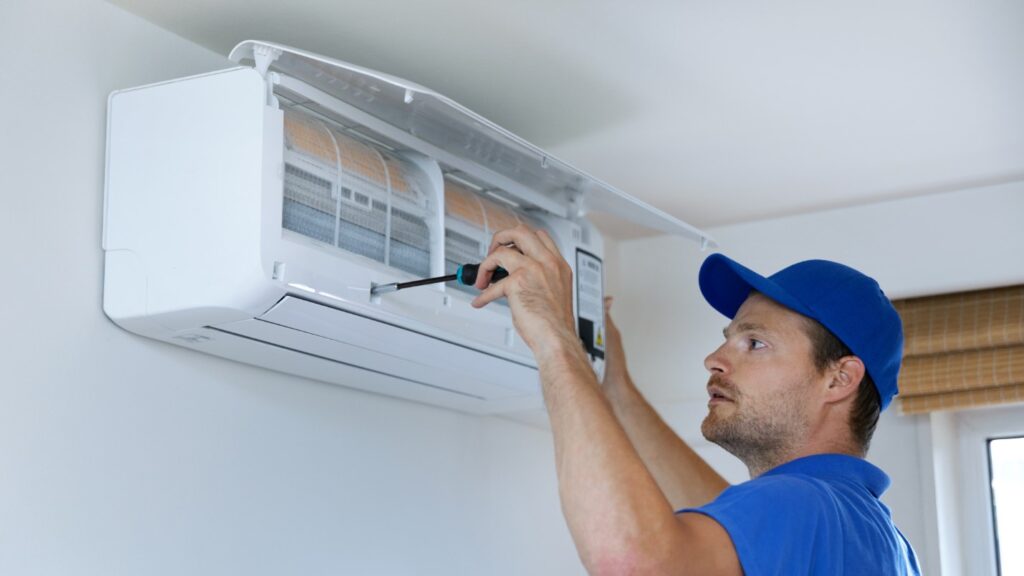When extreme temperatures hit, having a reliable heating, ventilation, and air conditioning (HVAC) system is essential. Keeping your HVAC system maintained is just as important than having one installed in your home and for that, HVAC companies Windsor rely on their teams of HVAC technicians.
But what exactly does an HVAC technician do? This blog will delve into the role of an HVAC technician, their responsibilities, the skills required, and the importance of their work in ensuring our homes and businesses remain comfortable and safe.
What Do HVAC Technicians Do?
An HVAC technician is a trained professional responsible for installing, maintaining, and repairing heating, ventilation, air conditioning, and refrigeration systems. These systems are crucial for controlling the indoor climate of residential, commercial, and industrial buildings.
The Core Responsibilities of an HVAC Technician
Let’s explore some of the important tasks of an HVAC Technician:
Installation
One of the primary duties of an HVAC technician is installing new heating and air conditioning systems. This involves assessing buildings to determine the appropriate system size and type. The technician will then install the system, which includes setting up ductwork, wiring, and controls. HVAC technicians are also responsible for teaching the HVAC purchaser about their new system and how to operate it.
Maintenance
Regular maintenance is vital to keep HVAC systems running smoothly. HVAC technicians perform routine checks and maintenance tasks such as cleaning coils, checking refrigerant levels, inspecting electrical components, and lubricating moving parts. Preventative maintenance helps to extend the lifespan of the equipment.
Repairs
When an HVAC system malfunctions, an HVAC technician diagnoses the problem and performs necessary repairs. This may involve replacing faulty components, fixing leaks, or addressing electrical issues. Quick and efficient repairs are essential to restore comfort and prevent further damage to the system.
Skills and Qualifications Required for an HVAC Technician
Here are some of the key skills and qualifications required to become an HVAC tech:
Technical Knowledge
HVAC technicians must have a deep understanding of how heating, cooling, and ventilation systems work. This includes knowledge of electrical systems, refrigeration cycles, and some basic principles of thermodynamics. Many technicians acquire this knowledge through formal education and training programs.
Practical Skills
Hands-on skills are crucial for HVAC technicians. They must be adept at using various tools and equipment, from wrenches and screwdrivers to more complex diagnostic devices. Precision and attention to detail are essential when installing, maintaining, and repairing HVAC systems.
Problem-Solving Abilities
Diagnosing and fixing HVAC issues requires strong problem-solving skills. Technicians must be able to identify the cause of a problem and determine the best course of action to resolve it.
Communication Skills
HVAC technicians frequently interact with clients, explaining system issues and the necessary repairs or maintenance. Good communication skills are vital to ensure clients understand the work being done and feel confident in the technician’s abilities.
Certifications and Licensing
In many regions, HVAC technicians must be certified and licensed to work legally. This typically involves passing exams that test their knowledge and skills. Certification programs, such as those offered by North American Technician Excellence (NATE), are widely recognized in the industry.
The Importance of HVAC Technicians
HVAC technicians play a critical role in maintaining the comfort and safety of our indoor environments. Here are some reasons why their work is so important:
Ensuring Comfort
A well-functioning HVAC system is essential for maintaining a comfortable indoor climate. Whether it’s keeping homes warm in the winter or cool in the summer, HVAC technicians ensure these systems operate efficiently and reliably.
Improving Air Quality
HVAC systems play a crucial role in maintaining indoor air quality. Technicians install and maintain systems that filter out pollutants, allergens, and contaminants, ensuring the air we breathe is clean and healthy.
Energy Efficiency
Proper installation and maintenance of HVAC systems can significantly improve their energy efficiency. This not only reduces energy costs for homeowners and businesses but also helps to reduce the environmental impact of these systems.
Preventing Health Risks
Malfunctioning HVAC systems can pose health risks, such as carbon monoxide leaks or poor air quality. HVAC technicians identify and fix these issues, ensuring the safety of occupants.
Extending Equipment Lifespan
Regular maintenance and timely repairs performed by HVAC technicians can extend the lifespan of HVAC equipment. This reduces the need for costly replacements and ensures that systems continue to operate efficiently for many years.
Signs You Might Need the Help of an HVAC Technician
Here are some signs that indicate you might need the help of an HVAC technician:
Unusual Noises
If your HVAC system starts making unusual noises such as banging, clanking, or screeching, it’s a clear sign something is wrong. These noises can indicate various issues and should be addressed by a professional to prevent further damage.
Inconsistent Temperatures
Are some rooms in your home warmer or cooler than others? Inconsistent temperatures often indicate an issue with your HVAC system’s airflow or ductwork.
High Energy Bills
A sudden increase in your energy bills without a corresponding change in usage can signal that your HVAC system is working inefficiently. A technician can identify and fix these problems to restore your system’s efficiency.
Frequent Cycling
If your HVAC system turns on and off frequently (a process known as short cycling), it may be struggling to maintain the desired temperature. This can result from various issues, including an oversized system, a faulty thermostat, or airflow problems.
System Age
HVAC systems typically last 10-15 years, depending on the type and how well they’ve been maintained. If your system is approaching or has exceeded this age range, it might be time to consider a replacement. An HVAC technician can help you determine the best course of action, whether it’s repairing your current system or installing a new one.
Reliable HVAC Technicians at Temperature Solutions
Looking for HVAC companies in Windsor with the best highly skilled HVAC technicians?
At Temperature Solutions, our HVAC technicians can handle problems of any size. If you need assistance with your HVAC system, don’t hesitate to contact us.
Our experts are just a phone call away at (707) 326-0424. Call now for top-notch service to keep your home or business comfortable year-round.

